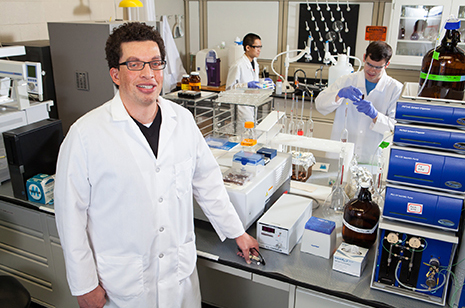Research Lab Puts Tulsa's Drinking Water Under the Microscope

Julian Fairey directs the Water Research Laboratory at the University of Arkansas.
FAYETTEVILLE, Ark. – Scientists at the University of Arkansas will spend the next two years developing an activated carbon that could lead to cleaner, safer drinking water in Oklahoma’s second-largest city.
Julian Fairey, an assistant professor of civil engineering and director of the university’s Water Research Laboratory, said the goal of the project is to improve Tulsa’s drinking water by decreasing the formation of regulated disinfectant byproducts. These chemicals are formed as an unintended consequence when drinking water is disinfected — organic matter present in source waters reacts with disinfectants such as free chlorine or chloramine to form the disinfectant byproducts.
Since the 1970s, scientists have identified more than 600 of these byproducts, many of them suspected carcinogens.
“It’s exciting,” Fairey said. “Any time we can work with water utilities — that’s a way of helping consumers. Ultimately that’s why we do the research, to help improve the quality of drinking water in U.S. drinking water systems. Working directly with utilities is the best way to impact drinking water quality on a daily basis, and that’s a great thing.”
All drinking water sources contain natural organic matter, derived from algae, land plants, soil and other natural substances. While particulate matter settles out during typical treatment processes, tiny particles called colloids remain in the water and react with free chlorine to form disinfection byproducts such as trihalomethanes and haloacetic acids, which are regulated by the U.S. Environmental Protection Agency.
In collaboration with Wen Zhang, an assistant professor of civil engineering at the U of A, researchers will analyze the chemistry and biology of Tulsa’s water at different stages of the drinking water treatment process. They will systematically modify the surface chemistry of the granular activated carbons — which filter chemicals dissolved in water — to enhance the absorption of the natural organic matter that serves as precursors to trihalomethanes and haloacetic acids, Fairey said.
The research, to be conducted in the Water Research Laboratory in the College of Engineering, is being funded through a $156,000 grant from the Tulsa Metropolitan Utility Authority.
Fairey, an environmental engineer, works on applied research projects to develop new technologies that will reduce the risks posed by pollutants in sediments and drinking waters.
In 2012, Fairey received a National Science Foundation Faculty Early Career Development Award. The award, known as a CAREER award, is one of the highest honors given by the foundation to junior faculty members.
Contacts
Julian Fairey, assistant professor, civil engineering
College of Engineering
479-575-4023,
julianf@uark.edu
Chris Branam, research communications writer/editor
University Relations
479-575-4737,
cwbranam@uark.edu
Headlines
Affairs of the Heart
Find out how biomedical engineering professor Morten Jensen is developing innovative devices to produce better outcomes in cardiovascular medicine.
Students, Faculty and Alumni Kick Off Centennial Year of School of Law
Founded April 14, 1924, the School of Law faculty, students and alumni started the celebration of its centennial year with a Founders Day event and will continue with more commemorative events this coming fall.
Yearly Academic Award Winners, Ambassadors Recognized by Bumpers College
Schyler Angell, Lexi Dilbeck, Cason Frisby, Tanner Austin King, Anna Brooke Mathis, Carrie Ortel, Lucy Scholma, Kadence Trosper and student ambassadors were honored at the college's annual reception.
World Premiere of 'Cries from the Cotton Field' Slated for May 8
Cries from the Cotton Field chronicles the journey of 19th century Italian immigrants from northern Italy to the Arkansas Delta and ultimately to Tontitown. It will premier at 6 p.m. May 8 in Springdale Har-Ber High School.
Fay Jones School's Earth Day Event Spotlights Sustainable Materials and Projects
"One day doesn't seem like a lot, but one day can empower individuals and groups, energize them to work for change and innovate for transformative solutions," professor Jennifer Webb said of the students' design work.




